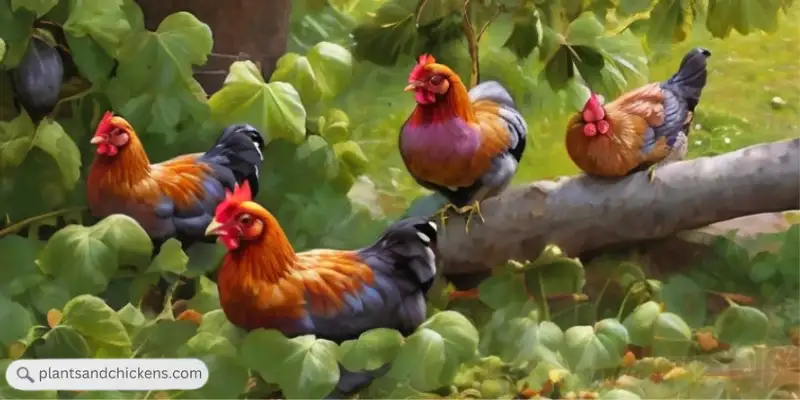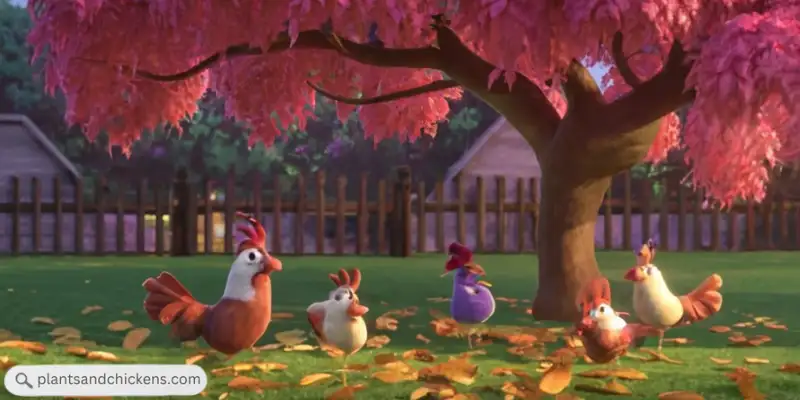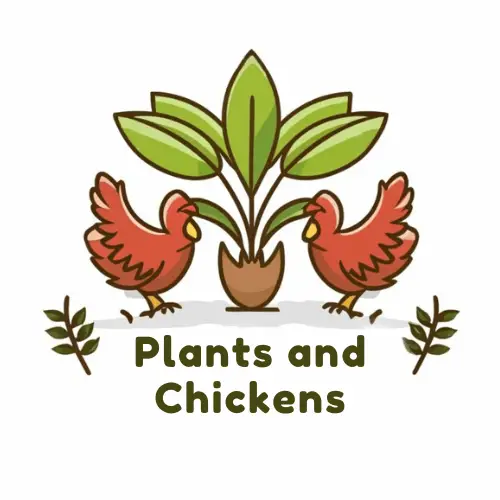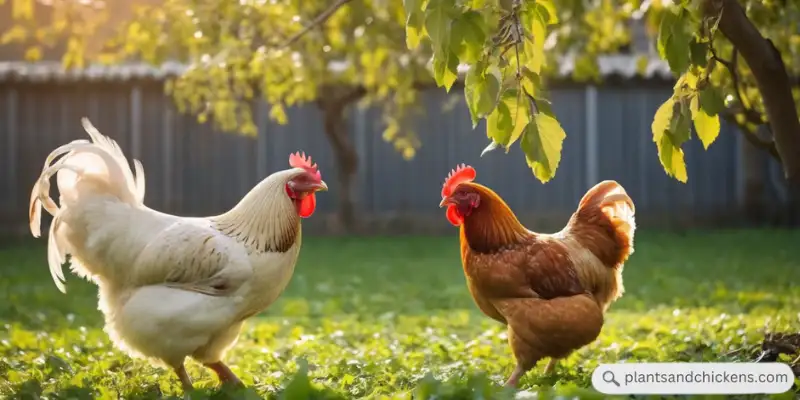Chickens can safely eat plum tree leaves, but they should be given in moderation. Chickens are known to have a varied diet, and their owners often wonder what they can and cannot eat.
When it comes to plum tree leaves, chickens can safely consume them as part of their diet. However, it’s important to note that moderation is key. Providing plum tree leaves as a treat in small amounts can be a healthy addition to their diet.
Plum tree leaves offer various nutrients and can be a source of entertainment for the flock. We will explore the safety and benefits of feeding plum tree leaves to chickens, as well as other fruits and plants that chickens can eat.
Table of Contents
Why Are Plum Tree Leaves A Concern?
Plum tree leaves can be a concern for chickens as they are toxic and poisonous to them. It is important to avoid feeding chickens plum tree leaves to ensure their health and safety.
Toxicity Of Plum Tree Leaves
Plum tree leaves can pose a potential risk to chickens due to their toxic nature. It is essential to understand the toxicity levels of these leaves to ensure the well-being of your flock. Plum tree leaves contain compounds such as cyanogenic glycosides, which can be harmful when ingested by chickens. These compounds can break down into hydrogen cyanide, a poisonous substance that can cause various health issues in poultry.
Potential Dangers For Chickens
When chickens consume plum tree leaves, they are exposed to potential dangers that can compromise their health. The toxicity of these leaves can lead to symptoms such as lethargy, difficulty breathing, diarrhea, and even death if ingested in large quantities. It is important to prevent chickens from accessing plum tree leaves, whether they are fresh or fallen. Even small amounts of these leaves can have detrimental effects on the overall well-being of your flock.
To protect your chickens from the potential hazards of plum tree leaves, it is crucial to ensure that their feeding area is free from any access to plum trees or fallen leaves. Additionally, providing a balanced diet that includes suitable alternatives such as leafy greens, grains, and insects can help meet their nutritional needs without compromising their health. Regularly monitoring their behavior and consulting a veterinarian in case of any unusual symptoms are also essential steps to keep your chickens safe and thriving.
In conclusion, it is important to be aware of the potential dangers that plum tree leaves can pose to chickens. Their toxicity and potential risks necessitate taking precautions to prevent chickens from ingesting these leaves. By ensuring a safe and suitable diet for your flock and monitoring their health regularly, you can keep your chickens healthy and protected from the potential hazards of plum tree leaves.

Safe Feeding Practices For Chickens
Feeding your chickens a balanced and nutritious diet is crucial to their overall health and well-being. While chickens are known to be omnivores and can eat a wide variety of foods, it is important to follow safe feeding practices to ensure their safety. In this article, we will discuss the best foods for chickens, what leaves chickens can eat, and what leaves chickens should avoid.
Best Foods For Chickens
When it comes to feeding your chickens, it is important to provide them with a balanced diet that includes a mix of grains, fruits, vegetables, and protein sources. Here are some of the best foods to include in your chicken’s diet:
- Grains: Oats, corn, barley, and wheat are all excellent sources of carbohydrates for chickens.
- Fruits: Apples, berries, melons, and bananas are all safe and nutritious fruits that chickens can enjoy.
- Vegetables: Leafy greens like lettuce, spinach, and kale, as well as carrots, cucumbers, and tomatoes, are all great options for chickens.
- Protein Sources: Chickens need protein for muscle development and egg production. Include sources like mealworms, earthworms, and cooked eggs in their diet.
What Leaves Chickens Can Eat
Chickens can safely consume a variety of leaves, which can provide them with essential nutrients and act as natural supplements. Here are some leaves that are safe for chickens to eat:
- Dandelion Leaves
- Carrot Tops
- Strawberry Leaves
- Pumpkin Leaves
- Squash Leaves
- Radish Tops
These leaves are not only safe for chickens to eat, but they also offer various health benefits due to their high vitamin and mineral content.
What Leaves Chickens Should Avoid
While there are many leaves that chickens can eat, there are also some that they should avoid. It’s important to note that not all leaves are safe for chickens and some can even be toxic to them. Here are some leaves that are toxic to chickens:
It is best to avoid feeding these leaves to your chickens to prevent any potential health issues or poisoning.
In conclusion, providing your chickens with a balanced and nutritious diet is essential for their health and overall well-being. It is important to know which foods are safe for chickens to eat and which ones they should avoid. By following safe feeding practices and including a variety of foods in their diet, you can ensure that your chickens stay healthy and thrive.
Can Chickens Eat Plum Tree Leaves?
Plum tree leaves are a common vegetation found in many backyards, and it’s natural to wonder if your chickens can indulge in them. While chickens are known to be omnivorous creatures, there are certain considerations when it comes to feeding them plum tree leaves. In this article, we will explore the benefits and risks of feeding plums to chickens, as well as the proper preparation methods.
Plums are a healthy addition to your chicken’s diet and offer several benefits. Here are some advantages of feeding plums to chickens:
While plums offer several benefits, there are risks associated with feeding them to chickens:
To ensure the safety and enjoyment of your chickens, follow the proper preparation methods when feeding them plums:
In conclusion, chickens can safely consume plum tree leaves as part of a balanced diet. However, it is important to consider the risks and benefits, properly prepare the plums, and feed them in moderation to ensure the overall health and well-being of your flock.

Other Fruits And Leaves Chickens Can Eat
Chickens are known for having an omnivorous diet, which means they can eat both fruits and leaves along with their regular feed. While it’s important to keep in mind that not all fruits and leaves are safe for chickens, there are several options that can be included in their diet to provide variety and nutrition.
Safe Fruits For Chickens
When it comes to fruits, there are a few options that you can safely offer to your chickens:
- Apples: Chickens love apples! They can enjoy them both peeled and sliced or as a whole, including the seeds.
- Watermelons: This juicy fruit is a great treat during hot summer days. Remove the rind and offer the red flesh to your chickens.
- Berries: Strawberries, blueberries, and raspberries can all be offered in moderation. Chickens enjoy pecking at them and they are packed with antioxidants.
- Bananas: Ripe bananas can be mashed and mixed with their regular feed or simply offered as a whole fruit.
- Pumpkins: Chickens not only enjoy eating the flesh of pumpkins but also the seeds. You can offer them fresh or cooked.
Safe Leaves For Chickens
When it comes to leaves, there are a few options that are safe for chickens to consume:
- Spinach: Chickens love the taste of spinach leaves and it’s packed with essential nutrients like iron and calcium.
- Kale: Similar to spinach, kale is another nutritious leafy green that chickens can safely consume.
- Dandelion Leaves: These common garden weeds are actually a great source of vitamins and minerals for chickens.
- Swiss Chard: This leafy green is not only safe for chickens but also a great source of vitamins A, K, and C.
- Romaine Lettuce: Chickens enjoy pecking at the leaves of romaine lettuce and it adds some variety to their diet.
It’s important to note that while these fruits and leaves are generally safe for chickens, they should be offered as treats and not as the main component of their diet. Treats should make up no more than 10% of their daily food intake. Always introduce new foods gradually and monitor your chickens for any adverse reactions.
Frequently Asked Questions Of Can Chickens Eat Plum Tree Leaves
What Leaves Can Chickens Not Eat?
Chickens should not eat plum tree leaves as they can be toxic.
Are Tree Leaves Good For Chickens?
Yes, chickens can eat tree leaves, including plum tree leaves. Adding fallen leaves sparingly to their run can provide entertainment as they scratch through them to look for bugs. However, be careful not to add too many leaves too often.
What Kind Of Leaves Do Chickens Eat?
Chickens can eat various types of leaves, including plum tree leaves. They also enjoy greens like lettuce, silverbeet, rocket, and herbs such as sage, oregano, mint, and catmint. However, it is important to note that citrus fruit is not suitable for chickens, but some chickens may enjoy citrus leaves.
Moderation is key when offering plums to chickens, as the pits can be toxic.
Can Chickens Eat Orange Tree Leaves?
Yes, chickens can eat orange tree leaves as they enjoy them, even though citrus fruit is not recommended for them due to acidity.
Conclusion
To conclude, chickens can safely consume plum tree leaves in moderation. Plums, along with their leaves, offer a nutritious and hydrating snack for your flock. However, it is important to remove the pits from the plums as they can be toxic to chickens.
Overall, adding plum tree leaves to their diet can be a beneficial and enjoyable addition for your chickens.


![Terrifying Trend: Why Do Roosters Chase Humans? [2024]](https://plantsandchickens.com/wp-content/uploads/2024/02/why-do-roosters-chase-humans-4.webp)


Leave a Reply